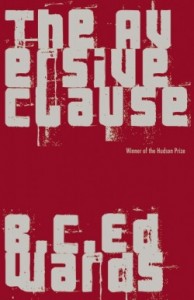The Aversive Clause by B.C. Edwards
 The Aversive Clause
The Aversive Clause
by B.C. Edwards
Black Lawrence Press, Feb 2013
176 pages / $16 Buy from Amazon or Black Lawrence Press
He lost me at:
St. Louis is a city entirely suburban, constructed and unnatural. Almost foreign after so many years in New York, and yet unmistakeably American. St. Louis is like watching a commercial for fast food.
I lived in St. Louis for four years, and it’s not that what B.C. Edwards is saying is not true. The city is made up of a bunch of sprawling residential pockets, peppered with soul-killing national chains and all the political tightness and hatred we’ve come to associate with middle America. It’s the way Edwards says it that makes me sad: as if St. Louis doesn’t even deserve a second look. As if he’s content to see it as a foreign planet, a place to visit for a while, and learn, and then return to New York City.
Of course, it’s the character talking here. Eli, from Brooklyn, whose entire growth cycle in “Bigger Than All These Buildings” relies on this dismissiveness. He flies to STL for his boyfriend David’s family reunion and for the length of it he is on the outside looking in, spiking the Kool-Aid and staying an arm’s length away from David’s aunts and their crucifixes. But a cathartic fight between brothers occurs, and in the end Eli suggests a visit to the St. Louis arch, the mythical and defunct Gateway to the West. “And they’re right,” he says. “All of them. It’s really something.”
The line is a satisfying ending to the story, on one level: not only does he cave in to the sightseeing all his boyfriend’s folks have recommended to him, but he also praises it with the kind of down-home phraseage that they’d probably described it with in the first place. It feels good. It feels indicative of emotional change. But on another level—and that’s in light of the rest of the story—the line feels a little patronizing to me. David’s family is still more or less nuts up to the end of the story, and salvation comes only after he’s left the thick of them. It’s almost too good, the ending, and maybe that’s because in a couple days Eli is going home.
It’s the same tone I sensed in much of the first part of The Aversive Clause. In the world of “Aggie with the Hat On,” “the streets rolled by, strip malls, neighborhoods, fast food, and the same again.” Aggie descends into a pathetic, drug-addled mid-American lifestyle until he encounters a surreal doppelganger. Milo in “Goldfish” drifts in and out of consciousness at a party after sexually assaulting his ex-girlfriend. Mattie and Zachs leave New York to rehab and turn over an old house and are forced to take on their own existential dilemmas when they find a giant iron statue of a cherry tree in the basement, left by the lonesome former resident.
July 15th, 2013 / 11:00 am
Memory of the Prose Machine by Sandra Doller
 Memory of the Prose Machine
Memory of the Prose Machine
by Sandra Doller
CutBank Books, Feb 2013
41 pages / $10 Buy from CutBank
Two days before I arrived home to the package that held Prose Machine, I sat in a restaurant in Moab, Utah, arguing with my girlfriend about poststructuralist theory. The endless bit about relevance. Do we really need to know that much about the gap between words and reality? About the absence of a referent for language? We’re eating hamburgers in a café here. We’re on a road trip in Utah. We’re speaking. We’re talking. Hello.
Emily wondered why the academics didn’t quit if the very form of their own work (language) went against the claims they made. As I saw it, admitting that language doesn’t have a one-to-one correspondence with what we’ve always hoped it does doesn’t make communication impossible; it just complicates it. Maybe even frees it.
Sandra Doller is, like me, one of the hopeful. She understands that a splatter of paint on the canvas is going to look like a penis to me and a popsicle to someone else. But that the important thing, I think, is the communication: there’s someone on the other end.
***
The central conflict of Memory of the Prose Machine, as of more than a couple other rad small press prose-poetry type books I’ve read recently, is meaning. That is, what does it mean when she says, in her opening lines:
Sandra Doller knows, because she’s already been told. She “has no theme,” her words are a bunch of words, that’s all, you can’t follow them because there’s nothing to follow. That’s just how the book is. And it’s not uncommon, I think, to have this kind of indeterminate non-referential Rorschach Test type of approach in cutting edge poetic writing these days. Language without a clear function. Phrases not connected in obvious ways. Words as the field of battle, rather than the images they evoke.
June 3rd, 2013 / 11:00 am
